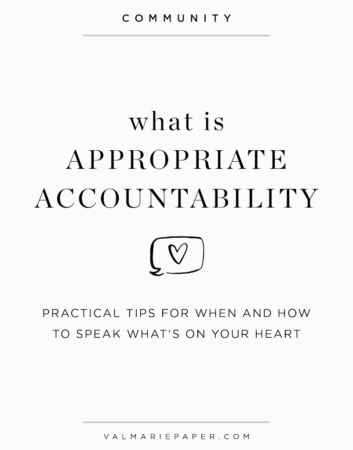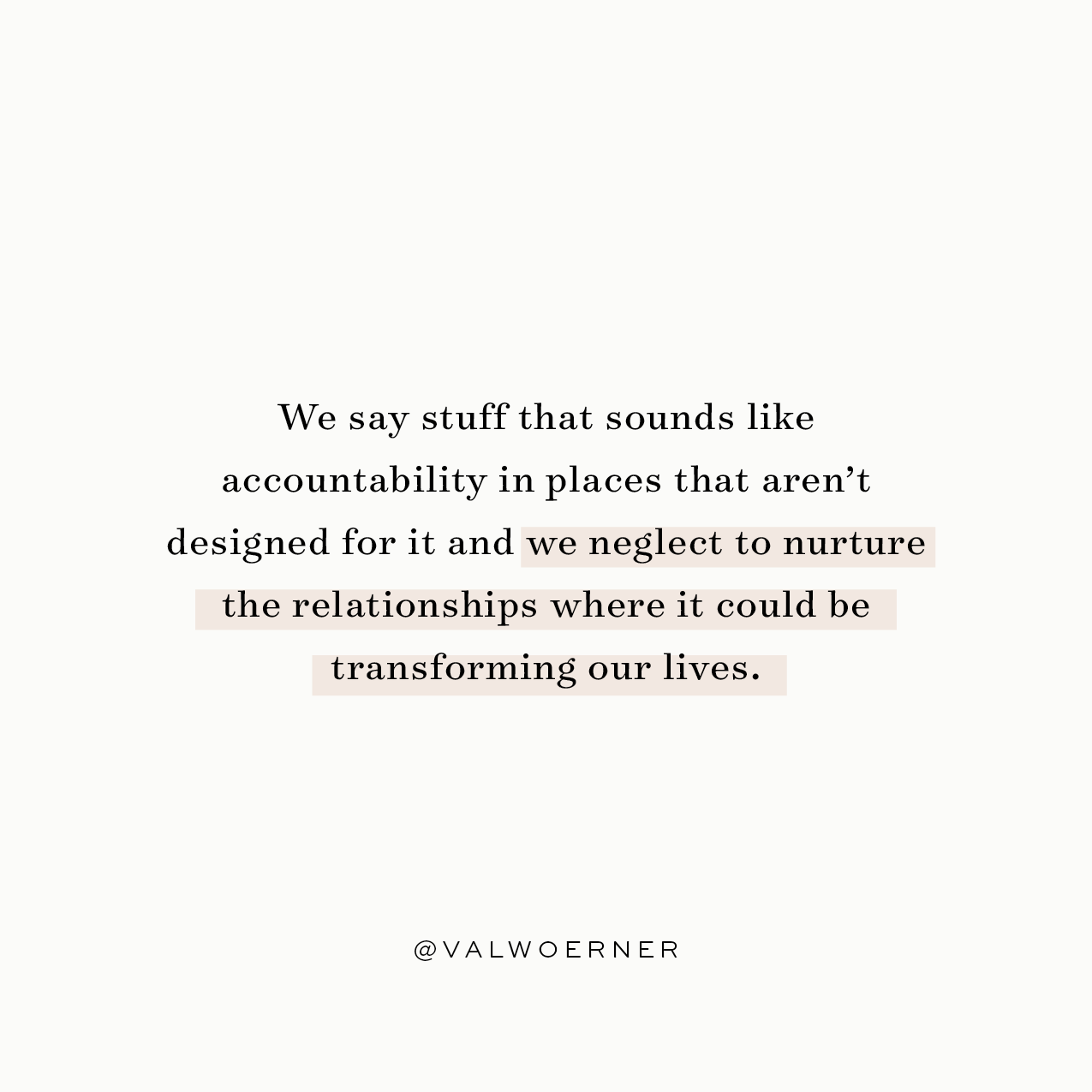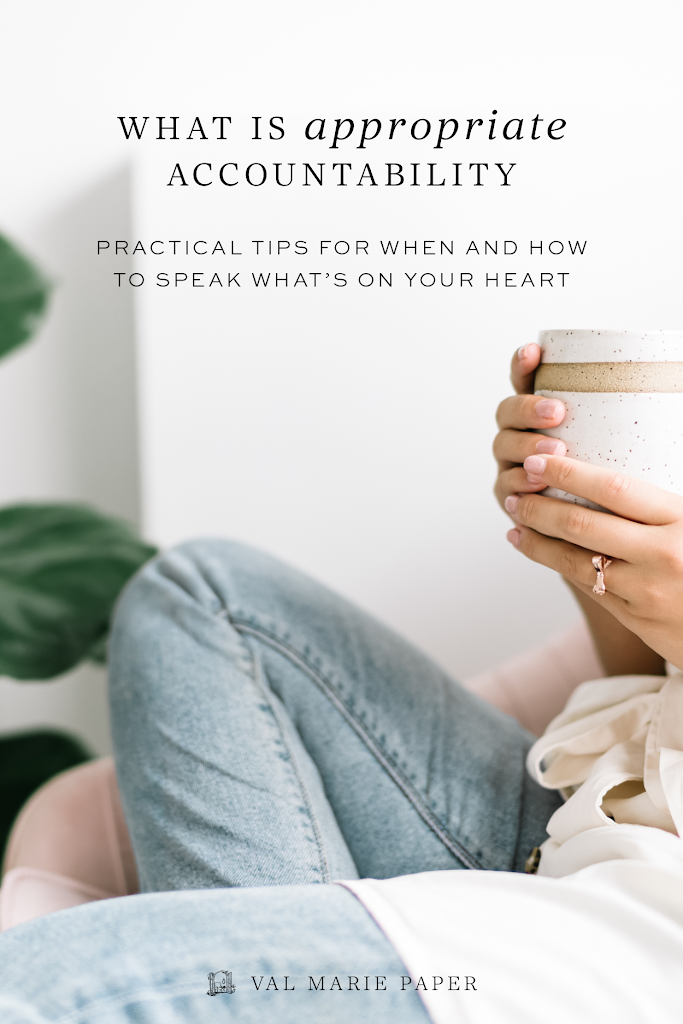 Accountability is a buzzword as we talk about any type of growth. It’s why we made our prayer course available to whole groups. It’s why we tell you to tag your friends so y’all can do your prayer journal prep together and share tips. It’s why we started our Facebook group and why we try to encourage you on social media.
Accountability is a buzzword as we talk about any type of growth. It’s why we made our prayer course available to whole groups. It’s why we tell you to tag your friends so y’all can do your prayer journal prep together and share tips. It’s why we started our Facebook group and why we try to encourage you on social media.
But accountability isn’t as simple or straightforward as we think.
Here are two examples of what I mean by that:
Recently, there was a situation with a friend (everyone loves a good vague story right??) who needed accountability in an area, but none of us around her felt close enough to say anything…So we didn’t. And guess what? The situation hasn’t changed. We just kinda tiptoe around things.
The other story? Someone left a comment on one of my Instagram posts calling it a “friendly reminder” that it’s not a tool (the prayer journal) that transforms your life, it’s God. I had a line worded in a recent post about how life-changing or transformational our journals were and this person isolated that phrase ignoring the rest of the post and the many other times I’ve shared that God is obviously the source of EVERY GOOD THING.
Maybe both stories sound familiar to you. It’s easy to not feel like you can say something to an “in real life” friend, but it also feels so easy to scold someone online with no context or relationship.
The truth is, I don’t think a lot of us are experiencing what God made possible through true accountability, myself included. I remember telling my husband that I’m CRAVING accountability, as silly as that sounds. I’m craving someone to tell me, “Val, I think you might be wrong on this one” or ask, “What’s your motive?”
But here’s the kicker. This doesn’t work with just anyone. Accountability is not for any and every relationship we have and I think that’s why we get confused. We say stuff that sounds like accountability in places that aren’t designed for it and we neglect to nurture the relationships where it could be transforming our lives.
I can sum it up with one line:
We have to get out of the comments and get into community.
And let me be the first to say, it feels a little ironic to share this through a screen so please know, I’m not scolding anyone. I’m preaching to myself here as much as anyone else today.
If you’ve left a comment hoping to change someone’s heart, join the club. I think we all have. But being on this side of it, I’m seeing how fruitless it is and that maybe my own motives in this area aren’t as pure as I thought they were.
Let’s start this conversation and work through it together. To be honest, I’ll share some advice but more than anything, I hope to shed some light on some questions we may need to wrestle with in prayer about our own relationships. 
First up, a few random points that I thought were good reminders:
1. Can you imagine the transformation just our political climate alone would have if these conversations were happening among trusted friends and not slung across comments? I think we’d all be a thousand times smarter because we’d be able to listen with real “listening ears” instead of waiting for our turn to rebuttal.
2. It’s hard to show a comment or critique as coming from love when it’s through a screen. Being in person and having a history with someone allows for lots of cues that what’s being said is to spur one another on (Hebrews 10:24).
3. We need to seek out relationships with people who can tell us when we’re being jerks or prideful or walking outside of God’s will, but that happens in relationship. That comes with a commitment, to not just voice our every opinion, but to follow the Holy Spirit’s leading. If we isolate ourselves from the truth, we’re in dangerous territory.
4. I’m fairly confident no unbeliever has ever been won over by a rude comment. Go look at political posts and see how heinous some of the things “believers” say to people they don’t agree with are.
5. The internet makes us feel so close to so many people. You’ve heard a ton about how we have replaced real community with social media. Doesn’t it make sense we take this too far with who we think we can comment on too?
6. In community, we know someone’s heart and don’t make flippant comments because our typing fingers are quick. In community, we care about the other person and speak intentionally knowing that just tossing something out there with no thought is damaging. It’s easier to be conscious of and sensitive to the person’s feelings when they are in the flesh.
7. In community, the one who needs correction can trust her community to tell her what she needs to hear. “Shake them haters off” is an easy attitude to take with people you don’t know but we cannot embrace that attitude at all costs. We’re only hurting ourselves if we can’t learn from others at all or assume “they’re just jealous.”
8. Jesus set the ultimate example of community. Though he preached to many, the bulk of his time was spent investing in 12 men.
Here are some questions to pray about as you think about the accountability in your own life. Some are pretty straightforward but make sure to make room for God to share what He might need to tell you.
- How do you know which friendships to be accountable to?
- And how do you develop relationships that can be accountable?
- Where’s the line? How do we figure this out?
Lastly, when an opportunity to hold someone accountable comes up, think about these things:
- Have I earned the opportunity to speak into her life? Like would I be ready to hear the same thing from her lips or would it feel disconnected and like they needed more context?
- Am I doing this in love? Why do I want to say this?
- Am I just hoping I’ll feel better sharing this? I shared a thought on this in Grumpy Mom Takes a Holiday: “Lifting each other out requires us to be really in tune with the Holy Spirit. Ephesians 4:15 says, “Instead, we will speak the truth in love, growing in every way more and more like Christ, who is the head of his body, the church.” Truth in love is the key, but before I run away with the idea that “I just gotta be real”, Elisabeth Elliot challenges me on what that really looks like. “There is a common belief that a frank expression of what one naturally feels and thinks is always a good thing because it is ‘honest.’ This is not true. If the feelings and thoughts are wrong in themselves, how can expressing them verbally add up to something good? It seems to me that adds up to three sins: wrong feeling, wrong thought, wrong action.” I am so guilty of not even questioning whether my thoughts are right but simply feel if I don’t say them, I’d be lying.
Phew! That was a doozy of a blog post! As I said, I’m still very much processing all this as well and curious what y’all think. Have you struggled to find this balance too?




Leave a Reply
Comments (0)